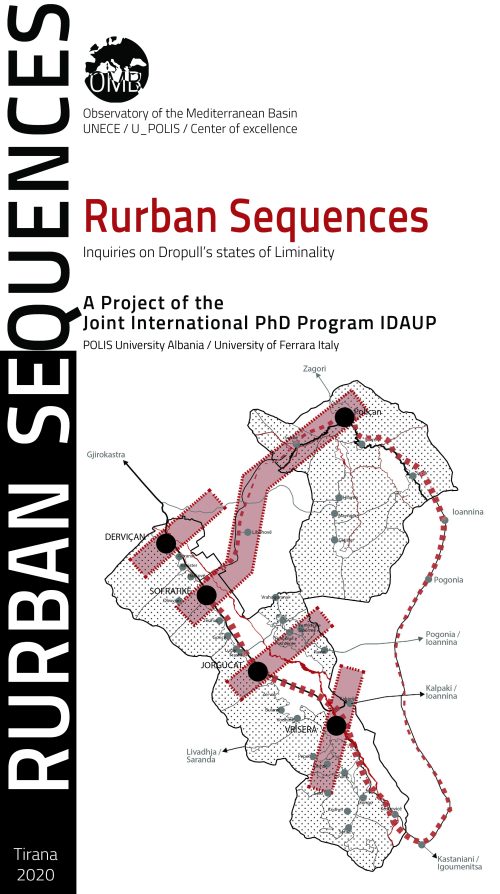OMB no.6 Rurban Sequences
Rurban Sequences. Inquiries on Dropull’s states of Liminality
A Project of the Joint International Ph.D. Program POLIS University, Albania – Ferrara University, Italy.
Editors: Prof.Dr. Besnik Aliaj, Dr. Loris Rossi, Dr. Sotir Dhamo
OMB Issue Academic & Linguistic Reviewer: Dr. Skënder Luarasi
Layout & Design: Besjana Qaja
English Editing: Laura Pedata
Preface
PROF. DR. BESNIK ALIAJ
Rector of POLIS University
Right after the local elections of 2015 in Albania, I (Besnik Aliaj) was invited in a meeting and training event with the newly elected municipal councilors and administrators of the Region of Gjirokastra, Albania, organized by the German foundation Friedrich-Ebert-Stiftung. During the meeting I was drawn by the remarks of Mr. Mihal Mano, the recently appointed deputy mayor of the Municipality of Dropull, a newly established municipal entity and a direct result of the latest administrative-territorial reform in Albania at that time. Mano stated that the new “municipality” (the larger territorial entity) was established through the unification of three smaller entities (of rural character), locally known here as 'communes'. Read more
Introduction
![]() Introduction from the Editors
Introduction from the Editors
BESNIK ALIAJ, SOTIR DHAMO
Interdisciplinary exchanges
![]() Rurality, landscaping, toursim and sustainbale develeopment
Rurality, landscaping, toursim and sustainbale develeopment
ALESANDRA BATTISI
![]() Liminality Articulations in Territorial Development: A Research On Biopolitics And Property Right Theories
Liminality Articulations in Territorial Development: A Research On Biopolitics And Property Right Theories
ARTAN KACANI
![]() Navigating Dropull through liminal spaces and thresholds
Navigating Dropull through liminal spaces and thresholds
LAURA PEDATA, ERANDA JANKU
![]() Dropull - liminal cultures / mapping identities
Dropull - liminal cultures / mapping identities
SAIMIR KRISTO, JOANA DHIAMANDI
Dropull Regulatory Plan
![]() Summary of the general Local Plan of Dropull Municipality
Summary of the general Local Plan of Dropull Municipality
POLIS UNIVERSITY
![]() Difficulties and innovation in GIS application at Dropull PPV case
Difficulties and innovation in GIS application at Dropull PPV case
AMANDA TERPO
![]() The creative process of statistical gathering and analysing in Dropull
The creative process of statistical gathering and analysing in Dropull
GODIVA RËMBECI
![]() Using innovation as a tool for inverting emigration trends in Dropull. How digital manufacturing could leap the technological gap and strengthen the connection between the community and its territory
Using innovation as a tool for inverting emigration trends in Dropull. How digital manufacturing could leap the technological gap and strengthen the connection between the community and its territory
LEDIAN BREGASI
![]() The process, difficulties and the innovative VSM findings of Dropull
The process, difficulties and the innovative VSM findings of Dropull
SHERIF LUSHAJ
Workshop
![]() Rurban Sequences. Inquiries on Dropull’s states of Liminality
Rurban Sequences. Inquiries on Dropull’s states of Liminality
WORKSHOP
![]() Sustainable tourism development in Liminal Spaces
Sustainable tourism development in Liminal Spaces
AIDA CIRO
![]() Inquiries on the liminality in between Raw material extraction sites and urbanized centers. Study case The quarry in the outskirts of Sofratike
Inquiries on the liminality in between Raw material extraction sites and urbanized centers. Study case The quarry in the outskirts of Sofratike
BLERIM NIKA
![]() Landscape of historical identity. Exploring Landscapes in the State of Liminality in/and the case of Sofratika
Landscape of historical identity. Exploring Landscapes in the State of Liminality in/and the case of Sofratika
EMEL PETËRCI
![]() Community-based rural development The potential of a shrinking village with agriculture vocation
Community-based rural development The potential of a shrinking village with agriculture vocation
ILARIA FABBRI
![]() Digital innovation in rural area. A vision for smart village in Dropull
Digital innovation in rural area. A vision for smart village in Dropull
JOAN KONOMI
![]() Shifting from liminality to destination. The case of Vrisera
Shifting from liminality to destination. The case of Vrisera
JOHANA KLEMO
![]() Actions for sustainable development: A strategy for rural growth in Dropull municipality through the promotion of local resources for building and construction
Actions for sustainable development: A strategy for rural growth in Dropull municipality through the promotion of local resources for building and construction
LAIA GEMM GARCIA FERNANDEZ
![]() Growing thickness as a research methodology
Growing thickness as a research methodology
LAURA BOFFI
![]() Overlapping Layers: a representation and learning landscape code for Dropull
Overlapping Layers: a representation and learning landscape code for Dropull
MARTINA SUPPA
![]() Structural Assessment and Seismic Performance of Traditional Stone houses in Dropulli region
Structural Assessment and Seismic Performance of Traditional Stone houses in Dropulli region
NIKOLLA VESHO
![]() Derviçan: a morpho–typological development analysis as a tool for its conservation
Derviçan: a morpho–typological development analysis as a tool for its conservation
VERONICA VONA
100 Villages
![]() Urban and Territorial Planning paradigms in transition. Academia 100+ Villages and Dropulli case
Urban and Territorial Planning paradigms in transition. Academia 100+ Villages and Dropulli case
LLAZAR KUMARAKU
Conclusions
![]() RURBAN SEQUENCES Inquiries on Dropull’s states of Liminality
RURBAN SEQUENCES Inquiries on Dropull’s states of Liminality
BESNIK ALIAJ, SOTIR DHAMO

